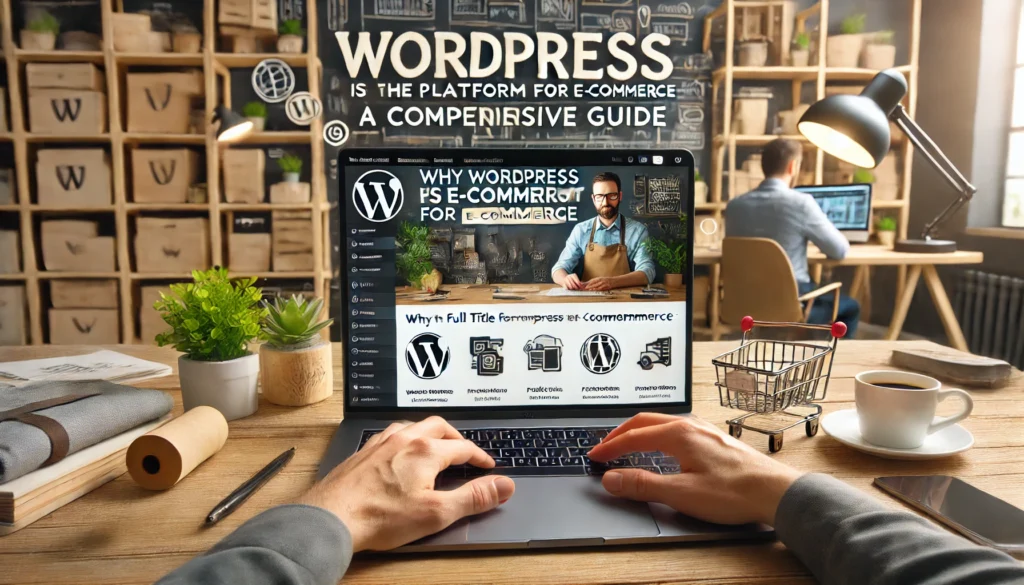







In today’s digital landscape, having a robust e-commerce platform is essential for businesses of all sizes. WordPress, initially known as a blogging platform, has evolved into a powerful and flexible solution for e-commerce. But why should you choose WordPress for your online store? In this comprehensive guide, we’ll explore the benefits of using WordPress for e-commerce, how to set up and customize your store, and the best practices for optimizing and marketing your online business. Whether you’re a small business owner or planning to scale to a global enterprise, WordPress offers the tools and flexibility you need to succeed.
Understanding the Advantages
WordPress powers over 40% of the websites on the internet, and it’s no surprise that many of them are e-commerce stores. Here’s why WordPress stands out as an e-commerce platform.
WordPress offers unparalleled flexibility, allowing you to create an e-commerce site that perfectly matches your business needs. With thousands of themes and plugins available, you can customize every aspect of your store—from the design to the functionality—without needing to write any code.
Compared to other e-commerce platforms, WordPress is highly cost-effective. The core software is free, and you can choose from a wide range of free and premium plugins and themes to enhance your store’s functionality. This flexibility in pricing allows you to start small and scale your investment as your business grows.
Whether you’re starting with a small online store or planning to expand into a large-scale e-commerce site, WordPress can scale with your business. The platform can handle everything from a few products to thousands, with the right hosting and optimization strategies in place.
Laying the Foundation for Your Store
Starting an e-commerce store with WordPress is straightforward, but there are some important steps to ensure you’re setting up your business for success.
Your domain name is your store’s address on the web, so choose something that reflects your brand and is easy to remember. Once you’ve decided on a domain name, you’ll need to select a reliable hosting provider. When it comes to e-commerce, performance is critical, so choose a hosting service that offers robust security, fast load times, and reliable support. Popular choices include Bluehost, SiteGround, and WP Engine.
To turn your WordPress site into a fully functional e-commerce store, you’ll need an e-commerce plugin. The most popular choice is WooCommerce, which powers a significant percentage of e-commerce sites worldwide. WooCommerce is free to use and highly customizable, with hundreds of extensions available to add additional features.
Other e-commerce plugins include:
Making Your Store Unique
Customization is where WordPress truly shines, allowing you to create a store that reflects your brand’s identity.
Your theme determines the overall look and feel of your online store. When selecting a theme, consider the following:
In addition to WooCommerce, several plugins can enhance the functionality of your WordPress store:
Efficient product management is essential for providing a seamless shopping experience:
Driving Traffic and Sales
SEO is crucial for attracting organic traffic to your e-commerce store. Here are some best practices to ensure your site ranks well in search engines.
Your product pages are the lifeblood of your e-commerce site. Optimize them by:
Site speed is a critical factor in SEO and user experience. Improve your site’s performance by:
SEO plugins like Yoast SEO and Rank Math offer tools and insights to help you optimize your entire site. These plugins guide you through optimizing on-page elements, generating XML sitemaps, and more.
Promoting Your Products
Marketing is essential to driving traffic and sales to your online store. Here are some strategies to consider.
Email marketing remains one of the most effective ways to engage with customers and drive repeat business. Use tools like Mailchimp or Klaviyo to segment your email list, automate campaigns, and track performance.
Social media platforms like Instagram, Facebook, and Pinterest are powerful tools for reaching new customers and engaging with your audience. Create a social media marketing plan that includes regular posts, promotions, and customer interaction.
Content marketing, such as blogging, can help drive traffic to your store and improve your SEO. Create valuable content that addresses your audience’s pain points, answers their questions, and guides them through the buying process.
Navigating the Obstacles
Running an e-commerce store can be challenging, but understanding potential issues and knowing how to address them can help you succeed.
Cart abandonment is a common issue for e-commerce stores. Reduce cart abandonment rates by:
Security is critical for e-commerce sites to protect customer data and maintain trust. Ensure your site’s security by:
Efficient inventory management ensures you always have products in stock and can fulfill orders promptly. Use WooCommerce’s built-in inventory management features, or consider integrating with an inventory management system like TradeGecko or Zoho Inventory for more advanced needs.
Common Questions About WordPress for E-commerce
Is WordPress good for e-commerce?
Yes, WordPress is an excellent platform for e-commerce due to its flexibility, customization options, and the wide range of plugins available to enhance functionality.
What is the best e-commerce plugin for WordPress?
WooCommerce is the most popular and widely used e-commerce plugin for WordPress, offering a comprehensive set of features and customization options.
Can I sell digital products on WordPress?
Yes, you can sell digital products on WordPress using plugins like WooCommerce or Easy Digital Downloads, which are specifically designed for digital goods.
Is WordPress secure for e-commerce?
WordPress can be highly secure for e-commerce if you follow best practices, such as using SSL certificates, keeping software updated, and using security plugins.
How do I optimize my WordPress store for SEO?
Optimize your store for SEO by using targeted keywords, optimizing product pages, improving site speed, and using SEO plugins like Yoast SEO or Rank Math.
Can I integrate social media with my WordPress store?
Yes, you can integrate social media with your WordPress store using plugins that allow social sharing, social login, and even product promotion directly on social media platforms.
WordPress is a powerful and flexible platform for e-commerce, offering everything you need to build, customize, and grow your online store. From choosing the right plugins and themes to optimizing your site for SEO and implementing effective marketing strategies, WordPress provides the tools and resources to help your business succeed. Whether you’re just starting or looking to scale your existing store, WordPress is a reliable choice that can grow with your business. Start building your WordPress e-commerce site today and take the first step toward online success.



Ready to take your project to the next level? At Freelanty, we connect you with talented freelancers who bring your vision to life. Contact us today and discover how we can help you succeed.